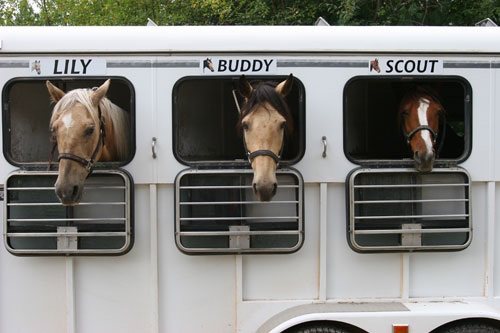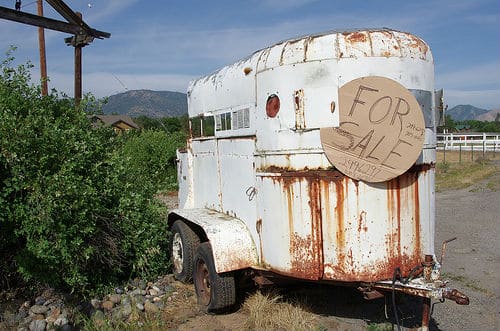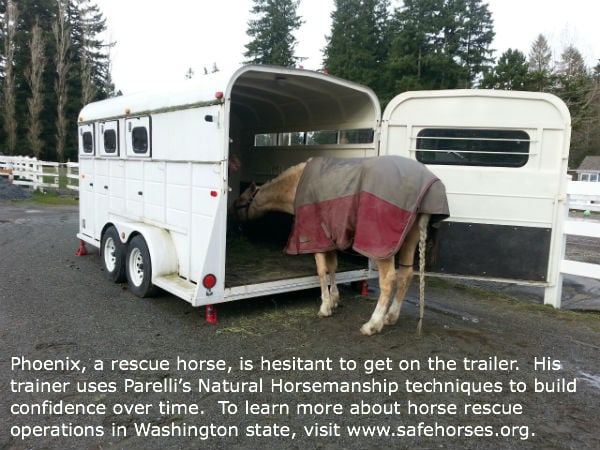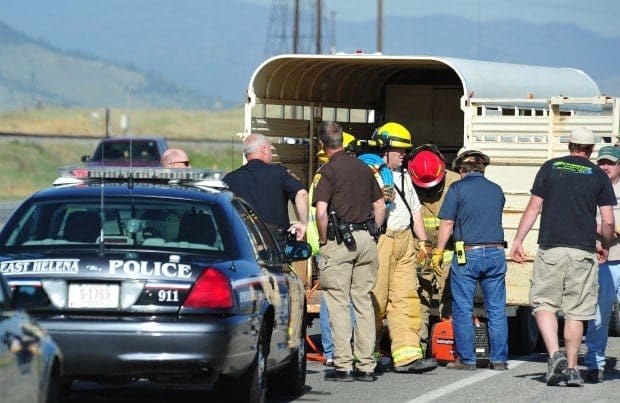10 Common Horse Trailer Mistakes You Are Probably Making
You think that you are an absolute pro when it comes to traveling with your horse. Season after season passes with no incidents at all. Then…one time… things go horribly wrong. Don’t let yourself get caught in this trap. Here are ten common mistakes that you make to endanger your horse’s safety.
1. “Like a Fish in a Net” - Hay Nets That Are Too Low
We spoke with Dr. Carrie Wheeler of Edelson Equine Associates in Manheim, Pennsylvania to learn about common trailer mistakes that can injure your horse. She explained that people often fill their hay nets with a great deal of hay to keep their horse occupied and happy during travel. As the hay net empties, it sags closer and closer to the ground, until eventually, it is dangerously close to the horse’s front legs. “I’ve seen a couple of horses get their legs accidentally caught in hay nets,” she said.
Now I want you to imagine how your horse would react if they were inside a trailer and suddenly can’t move a front leg because it is tangled in a net with course nylon strings. It’s not going to be pretty. That’s for sure!
Besides causing the horse emotional stress after it is stuck, the hay net can actually do some serious damage to their tendons. The hay net strings will act as a tourniquet around the delicate tissues in the back of the leg and cause swelling. This will increase the tightness of the tangle and the problem will get worse and worse.
Over time, a bowed tendon can result which often leads to permanent damage and weakness in your horse's leg. To avoid this problem, make sure that your hay net is hung high enough off the ground so that it won’t sag low even after it has been emptied of its contents.
2. “Rusty Fallout!” - Failing to Maintain the Horse Trailer
Rusted frames, rotten floors, broken latches, and poor electrical connections are just a few of the things that can cause serious issues with your horse trailer. We’ve written numerous articles about how to maintain your horse trailer floor, how to properly stow it over the winter, and how to make sure it is generally safe for use.
Dr. Wheeler explained, “We see lots of horses get cuts and injuries from improperly maintained trailers.” The smallest of these are cuts from rusted or sharp spots on the interior of the trailer. The largest injuries are from horses who need to be put down after a serious traffic accident or floor failure.
It is a good idea to check your trailer over after every use to see if any damage has occurred that needs attention. Dr. Wheeler said, “You need to look at your trailer and make sure it’s safe. Make sure there’s not a lot of rust especially where their legs are, or lower where they may kick. Also, if you have ramps, check the hinges to make sure those pieces are in working order.”
Do a more thorough inspection once a year and strongly consider having a professional check it over to make sure it is road worthy and safe for use.
3. “Not Like That!” – Shipping Wraps That Cause Tendon Damage
Here’s a topic that should be fresh in your mind if you read our blog regularly. Improperly applied shipping bandages can be a BIG problem!
Leg wraps that are wound unevenly or with bandages that are too stretchy can create a tourniquet on your horse’s leg just like that nasty hay net we just discussed. This has the very real potential of doing permanent damage to tendons.
Shipping boots are a safer option for novices, but it is important to make sure the boots fit properly and that your horse is accustomed to their feel before loading up for a trip. “Make sure you have appropriate supplies, they fit your horse, and that you’re comfortable using and applying them. Practice using everything.”
Learn more about proper leg protection application.
4. “You Want Me To Do What?”- Allowing a Horse to Become Trailer Sour
Remember that good horsemanship plays a large part in having a safe and enjoyable trip with your horse. If you go several seasons without taking your horse on any trips, don’t be surprised if he balks when you try to suddenly load him onto the trailer.
Even after you manage to load him, horses-out-of-practice will be more likely to dance around nervously and explode out the back doors when it comes time to unload. Make sure that your horse is acclimated to the trailer from regular trips so they can load, travel, and unload safely and calmly.
5. “I Don’t Like THAT Trailer!” - Switching Trailer Types Suddenly
Just as long breaks without trailering can throw a horse off, sudden switches in the type of trailer can cause a problem. Take it slow when switching your horse to a new trailer type. A 2 horse bumper pull horse trailer is going to look and feel completely different than a huge 3 horse slant trailer with living quarters!
Give your horse time to become acclimated to this new trailer with loading practice and short trips before you jump in with both feet.
6. “Hey! Don’t Leave Me!” - Leaving a Loaded Horse Unattended
“Always watch your horse in the trailer!” Dr. Wheeler had several stories to share here that illustrate why it’s incredibly important to make sure someone stays with your horse while the trailer is loaded.
In one example, a family left their horse loaded in a two horse trailer with the front manger door open while they went to register for a horseshow. The horse panicked, reared up, and went for the only escape route he could see – the front manger door! Dr. Wheeler remembered dealing with the frightened horse. “That can be a scary situation trying to get him unstuck.”
A similar problem can arise if you leave the side access doors open. “Make sure you are always watching a horse that is loaded on a trailer and don’t leave them unattended.”
7. “Mom! He’s Kicking Me! – Riding With Bad Traveling Buddies
When discussing leg wraps with Dr. Wheeler, she explained that leg wraps are actually most important when trailering with other horses. “They could easily kick your horse!” This is why it’s important that you are somewhat familiar with the temperament and the habits of your horse’s travel companions. If you know a friend’s horses is wild and unsettled during travel, you might not want to load your horse in beside him!
8. “What a Sweaty Mess!” - Allowing Your Horse to Overheat in the Horse Trailer
Overheating is common problem for horses in the summer time especially in mill-finished aluminum horse trailers. This material traps the heat from the sun and turns your trailer into an oven on wheels. Besides making your horse uncomfortable, this can lead to excessive sweating and dehydration.
That is why it’s important to look for trailers that have a double layer of material in the roofs to insulate away the sun’s heat. A Z-frame material trailer is ideal for this. Also, look for ceilings that are painted white since they will reflect away more heat and contribute to a lighter interior.
Finally, in the wintertime, carefully consider whether or not your horse needs a blanket during travel. It’s always a good idea to have some ventilation in your trailer, but many people tend to over blanket their horses, causing them to sweat and become chilled during travel. If your horse has a nice winter coat, traveling companions, and an enclosed (non-stock) trailer, then chances are, they can go without a blanket.
9. “Slow down!” – Driving Too Fast
Many people at the wheels of a loaded rig forget that a horse trailer is not going to provide the smoothest of rides no matter how fancy it may be. To illustrate this, have a friend drive you around the pasture while you are standing in the back. This will give you a better idea of what is like for your horse during travel.
Drive at a safe traveling speed while on the road and take turns slowly so that your horse is able to balance during the ride. Erratic driving will not only cause them stress, but also tire them out as they try to balance around every twist, turn, and dip. There’s nothing worse than arriving at an event with a tired and cranky horse!
10. “Officer, I Thought I Was Fine.” - Using the Wrong Type of Hitch or Tow Vehicle
It is not uncommon for people to buy a fancy new truck, a fancy new trailer, and assume they are good to go. The thing they forgot to remember is the hitch! It is important to make sure that your hitch is properly rated to handle the full load of your horse trailer and tongue weight.
Also, make sure that your tow vehicle is up to the challenge. An improperly matched tow vehicle, hitch, and trailer can cause disaster on the road. Learn more about this topic in our recent article.
Now, be honest…how many of these mistakes have you made in the past? It’s okay. Live and learn. Happy Travels!






